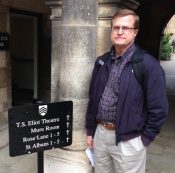By Glynn Young
In late December, a story idea took possession of my head, and I began to write. The narrative flowed like it never had before with five previous novels. This one was different; its predecessors had been part of a series, while this one was a completely different story.
On Feb. 18, I write this note in my writing log: “Reach 90,543 words. First draft is completed.” While I can’t say it was effortless, the writing of this story was surprisingly easy. I knew from the beginning how the story would end, and, working without an outline, I kept moving toward that end.
Then came the formal editing.
I call this phase “formal editing” because I tend to reread, edit, and rewrite as I write. Formal editing is when I read the entire manuscript from beginning to end. I look for holes. I examine scenes that are missing that need to be there and scenes that are there but shouldn’t be. I look at my assumptions that something is clear when it’s not at all. I look for story errors and non sequiturs. I question what I’ve written coming out of the mouths of characters. I read a section, and I realize that a new scene is needed. Or a character decides that something else should be happening (making me wonder who’s really in charge of the manuscript). One full read-through is devoted to looking for typos, missing words, and grammar errors.
I’ve spent more time editing than I did writing. I’ve spent more intense time editing than I did writing. Editing requires sweat and what sometimes feels like blood when a cherished scene has to be jettisoned. Writing often brings me joy; editing brings me pain.
My writing log tells the story. The first entry is Dec. 27, and it simply reads “1,500 words written.” Six weeks later, I’ve finished the first draft. Then the log, with daily entries and sometimes multiple daily entries, notes increases and decreases in the word count. I reach a high of 93,165 words on March 11. I reach a final word count of 89,995 on April 17. The five weeks in between record fluctuations, generally trending downward but often jumping back up.
I’ve edited this full manuscript eight times. I did not keep track of how many times I worked over a small section or a chapter, or when an idea struck me, and I found the scene and changed it.
And it’s during the editing process that I most fight discouragement. The story seemed so much better when I was writing; what happened? Doubts creep in. Is this really as good as I thought it was? Does it make sense? Does it seem true? Is this realistic? None of those questions bothered me while I was writing. But now they’ve taken over my head.
What helps is to remember what Stephen King wrote in On Writing: A Memoir of the Craft: “When you write a story, you’re telling yourself the story. When you rewrite, your main job is taking out all the things that are NOT the story.”
Editing is just as important as writing. But it is harder, and not as much fun.
Yesterday, I reread the manuscript for the ninth time. I found two typos and a missing word.
Editing never stops.
Writing often brings me joy; editing brings me pain. @gyoung9751 #ACFWBlogs #writetip #critiques #ACFWCommunity Click To Tweet Editing is just as important as writing. But it is harder, and not as much fun. @gyoung9751 #ACFWBlogs #writetip #critiques #ACFWCommunity Click To Tweet Glynn Young is a national award-winning speechwriter, communications practitioner, and novelist. He’s the author of four published novels, Dancing Priest, A Light Shining, Dancing King, and Dancing Prophet; and Dancing Prince; and the non-fiction book Poetry at Work. Visit Glynn on Facebook, Twitter, LinkedIn, Pinterest, his blog, the Dancing Priest book page, and his business website.
Glynn Young is a national award-winning speechwriter, communications practitioner, and novelist. He’s the author of four published novels, Dancing Priest, A Light Shining, Dancing King, and Dancing Prophet; and Dancing Prince; and the non-fiction book Poetry at Work. Visit Glynn on Facebook, Twitter, LinkedIn, Pinterest, his blog, the Dancing Priest book page, and his business website.

Comments 1
Editing is NOT fun, Glynn, that’s for sure, but as we both know, it is crucial. Keep plugging away!
Blessings!